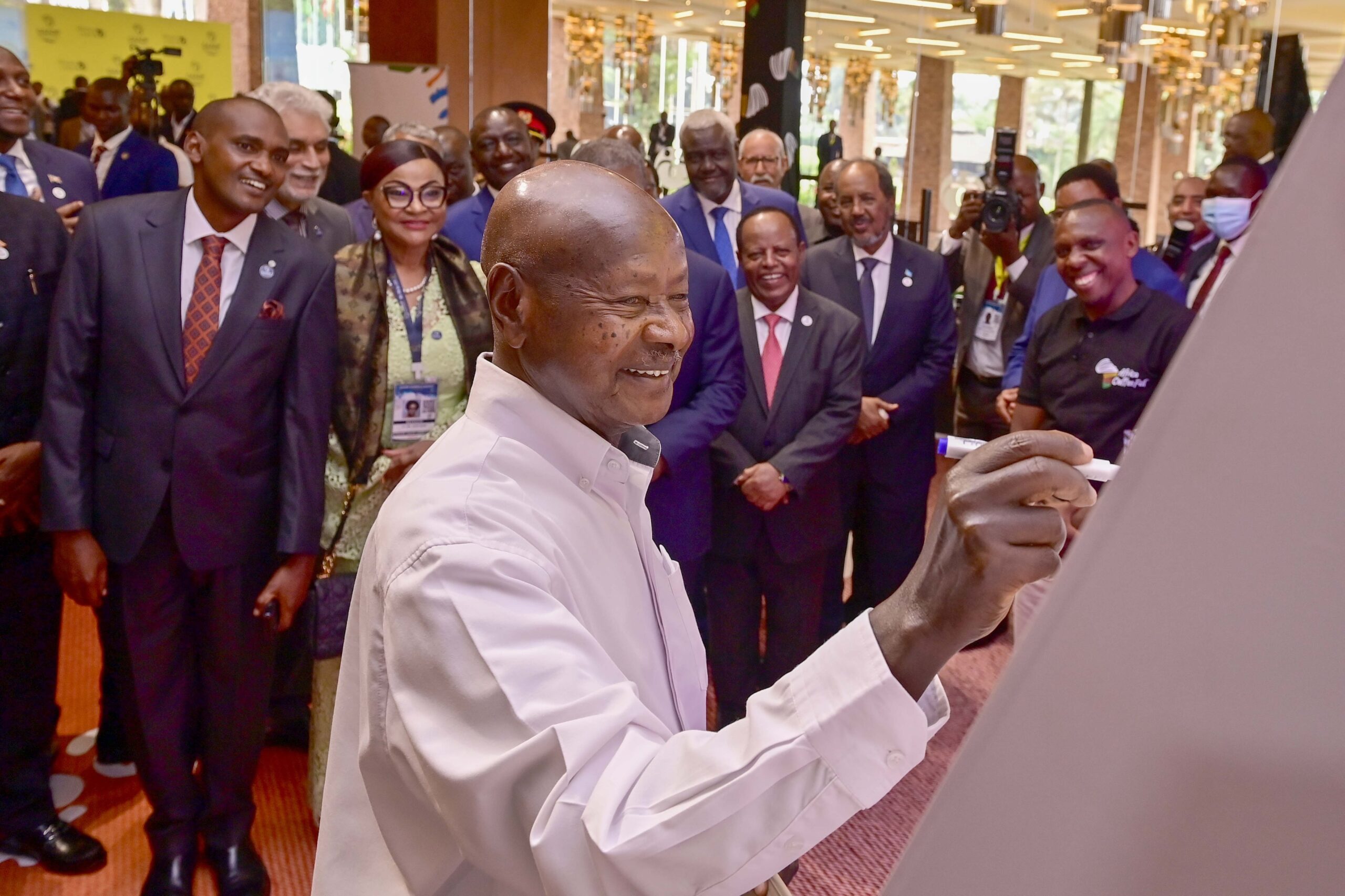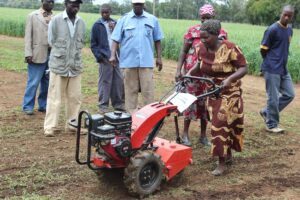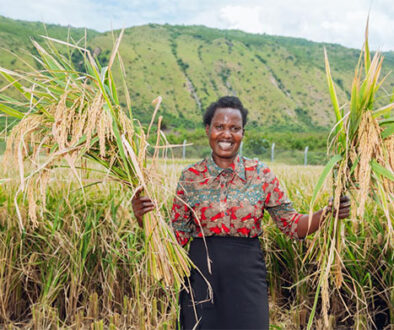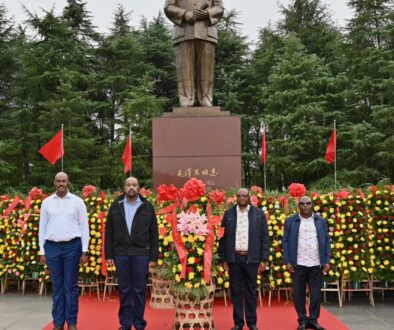Leaders approve strategy for Africa’s agri-food methods

CAPTION: President Museveni signs on a board as other Head of State and delegates look on at the closing of three days of meetings at Spere Resort Munyonyo Organised by the African Union on Saturday, January 11th 2025. (PPU Photo).
MUNYONYO – The Head of State and government from Africa have endorsed a new strategy aimed at improving the agri-food systems in the continent. The UN Food and Agricultural Organization hold that Africa holds the key to moving towards a world free from hunger and poverty.
It states that It is in Africa where enormous gains can be made, and agri-food systems transformation is the definitive foundation for the continent to realize sustainable development and modernization.
The leaders have agreed on a new 10-year agriculture strategy for Africa at a Summit at Speak Resort Munyonyo. It is hoped that it can transform agri-food systems to be more efficient, more inclusive, more resilient, and more sustainable to deliver on the commitments of the Sustainable Development Goals and the post-Malabo agenda.
Further, the leaders says by encouraging better production through such means as mechanization, digitalization, and agri-food industrialization, and green-powered irrigation, African nations can boost productivity and efficiency, and enhance resilience to the climate crisis. Studies show that more than 1 billion Africans cannot afford a healthy diet.
The summit which follows three days of meetings of the Ministers of agriculture and foreign affairs who have been meeting in Kampala at a Summit Organised by the African Union.
The ministers put final touches to the Comprehensive Africa Agriculture Development Programme (CAADP) Strategy and Action Plan, set to run from 2026- 2035.
The Comprehensive Africa Agriculture Development Programme (CAADP) Strategy and Action Plan, set to run from 2026- 2035, has been under development over the last 10 months, following directives from the African Heads of State and Government. It has been guided by the African Union Commission.
The CAADP strategy under the Kampala Declaration and the action plan is expected to boost the implementation of the Malabo Declaration on Accelerated Agricultural Growth and Transformation for Shared Prosperity and Improved Livelihoods, adopted in 2014.
It aims to leverage resources for driving economic growth, enhancing food security, and improving livelihoods, while addressing the impacts of climate change, in alignment with the CAADP principles. And it seeks to achieve this by stimulating investment, fostering partnerships, and empowering vulnerable smallholder farmers.
It is aligned with the African Union’s Agenda 2063, which envisions among others, a prosperous Africa based on inclusive growth and sustainable development. It also emphasizes achieving food security and nutrition, transforming agriculture into a leading driver of economic growth, and reducing the continent’s dependence on food imports.
Amb. Josefa Sacko, the AU Commissioner for Agriculture, Rural Development, Blue Economy, and Sustainable Environment She said overall, the 10-year CAADP Strategy and Action Plan aims to boost food production, expand value addition, boost intra-Africa trade, create millions of jobs for our youth and women, build inclusive agrifood value chains, and build resilient and sustainable agrifood systems that will withstand shocks and stressors now and in the future.
Ambassador Sacko said they are dedicated to strengthening governance through evidence-based decision-making and enhancing accountability among all stakeholders. “Inclusivity is a fundamental aspect of our approach; we will ensure that women, youth, and marginalized groups have access to resources, thereby facilitating their equitable participation in the agri-food sector,” she said.
 CAPTION: A farmer pushing a hand attractor to prepare the garden for planting season. (File photo).
CAPTION: A farmer pushing a hand attractor to prepare the garden for planting season. (File photo).
According to Amb. Sacko, the Kampala CAADP declaration is different from the ones that have been implemented during the last two decades because it has included a comprehensive strategy and plan. The Maputo and later Malabo declarations solely focused on the declarations.
“This will allow the Member States to begin implementation immediately after the Head of State and government have adopted it. We now have a clear roadmap, a theory of change that outlines the pathways for transformation, realistic and implementable strategic objective” she said It is expected that once implemented, it will enhance the food system approaches and targets the continent’s aspirations.
Adopted in 2014, the African Union’s Malabo Agenda intended to foster agriculture-led development that eliminates hunger, reduces poverty and food insecurity. The decade covered by the Malabo agenda comes to an end with mixed results. One of the major challenge is that the continent has failed to meet the ending hunger targets which have been met this year.
Speaking at the opening of the high-level ordinary summit, President Museveni decried the fact that Africa still lacks or begs for food. “This Africa of having no food, of begging is not the real Africa. But the colonial and neocolonial Africa. It is a shames” he said.
Museveni urged for the removal of the nontariff barriers the African Continental Free Trade Area (AfCFTA) to stimulate trade and provide financial support throughout the agricultural value chain. “There is no doubt that nontariff barriers undermine the advance of agriculture in Africa. If you have bumper harvests, let products” he said.
The most recent AU Biennial Review of the Malabo Declaration encouraged member states to implement national and regional policies and strategic plans that facilitate timely and sufficient access to fertilizers.
“This includes the removal of tariff and non-tariff barriers under the African Continental Free Trade Area (AfCFTA) to stimulate trade and provide financial support throughout the agricultural value chain” it said.
Additionally, countries were urged to work towards implementing the 10-year action plan and the Soils Initiative for Africa.
Other challenges include the fact that most of food production in the continent is rain-fed. Only about 10 percent of food production in Africa comes from irrigated lands.
 CAPTION: A farmer uses a hand hoe to weld in her garden. (File photo)
CAPTION: A farmer uses a hand hoe to weld in her garden. (File photo)
FAO has indicated that in many countries, water scarcity represents a critical constraint to food production and a major cause of poverty and hunger.
The FAO further notes that improved water management is one of the keys to producing enough food to alleviate the suffering of today and feed an additional 3 000 million people by the year 2030.
The fight for the Nile River water with in the Nile basin and countries in North Africa persist. Museveni wondered why Africa has not discussed with DRC about how the water from the Congo River can be used to boost agriculture productivity.
“Uganda is lucky in that we have a lot of water. Out major problem is to persuade our uninformed or misinformed people by guiding them to stop undermining our water resources by encroaching on the wetlands” Said Museveni.
The Biennial Review panel also found that the low usage of fertilizers and significant disparities among African countries in fertilizer application rates are likely not to realize the expected improved crop yields hence likely to be a major obstacle to achieving food sufficiency and prosperous farming communities.
“To establish resilient food systems, end hunger, and ensure African farmers’ prosperity, it is imperative to incentivize all countries to increase their fertilizer application rates” it said.
The President of Ethiopia, Taye Astike Selassie called for a renewed commitment and concerted action for Africa that is food sovereign and prosperous. “This summit makes a defining moment for Africa where we will be able to chart out the continent’s agri-food system” he said.
He said with the growing population growth, Africa has to ensure the availability of diverse and high quality food products. “The huge potential of technological innovation such as digital agriculture, precision farming and other innovations are pivotal to transforming our agri-food system.”
President, Taye Astike Selassie said. He said the Kampala CAADP declaration signifies a renewed commitment to best propel progress and delivering tangible outcomes for the people of Africa.
Recent estimates by the UN indicate that more than a billion Africans cannot afford a healthy diet. While the effects of these shocks have had global impacts, it is in Africa that the proportion of the population affected by hunger has increased the most.
Increasing prices of food, fuel and fertilizers have led to increased food price inflation and brought additional millions of Africans into a state of food insecurity because of the heavy reliance of the continent on international food markets for wheat, rice and edible oils.
The Chairperson of the African Union Commission, Moussa Faki Mahamat said Africa should be proud that it has a young population that constitutes 60% of its total population. And that it should be also proud that it has 60% of the world’s uncultivated arable land, ester and forest resources.
“This is why it is deeply questioned about the current paradoxical food security situation. Hunger still kills in Africa. The profound disaffection between land and African youth. The disaffection of these young people and agriculture and the real world, their separation with ancestral land towards urban uncertainties increase our existential drama.” Observes Mahamat.
He then asked who should be held responsible for such a phenomenon. “Not the youth for sure. But our systems. They have failed to promote efficient strategies that generate hope and prosperity in our land” he said.
Has been noted that many member states continue to under fund the Agriculture sector budgets it many refer to it as the backbone for their economies ad livelihoods. Embedded in the CAADP framework, and adopted in 2014, the Malabo Agenda was intended to contribute to implementing agriculture-led development on the continent that eliminates hunger, reduces poverty and food insecurity, and facilitates higher sustainable economic growth and development.
Bjørg Sandkjær , the State Secretary (Deputy Minister) for International Development at the Norwegian Ministry of Foreign Affair said the development partner have supported the African Union since 2003 when the Maputo declaration was pronounced.
She said despite impressive gains in food production and agricultural growth, challenges persist in achieving the goals of poverty reduction, food insecurity and inclusive growth as laid out in the CAADP framework.
“Today, we stand at a pivotal moment. We have as development partners a strong message from the discussions at the summit. We have had the reaffirmation of commitment by the member states to a transformation agenda. And agenda that shifts from traditional growth to more holistic and integrated growth” she said.
The new strategy emphasizes the critical role of agri-food systems not just for economic growth but ensuring food security improved nutrition and sustainable health outcomes for all.


